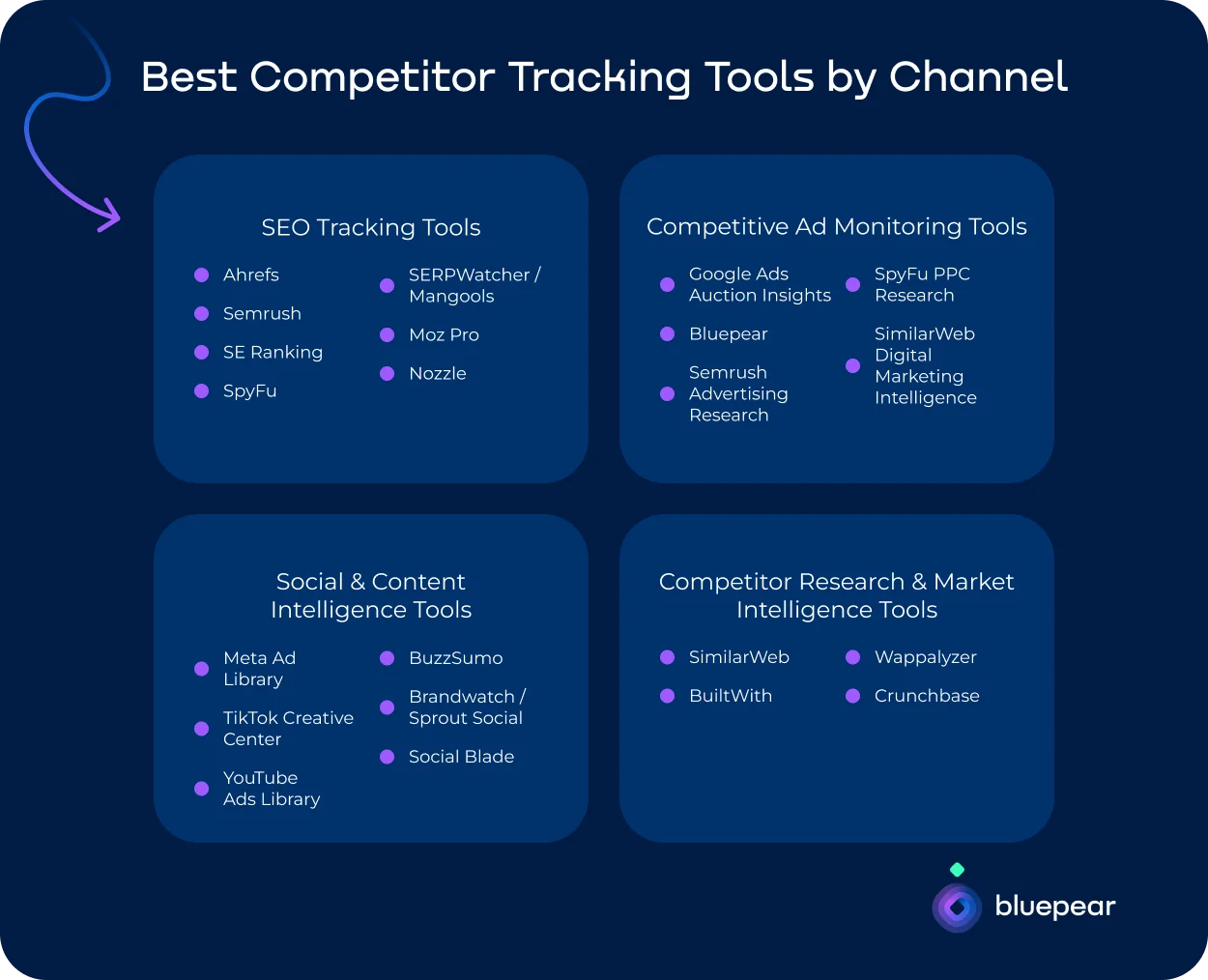
Contents
According to HubSpot’s State of Marketing report, only 82% of marketers feel their promotion strategies were effective in 2024. Meaning roughly one in five businesses are not confident in the effectiveness of their marketing. Competitor research is a sure way of building a marketing strategy that holds up to industry standards. The data it provides can tell you which growth tactics actually work for your niche and which are not worth investing in. This guide will walk you through practical, ethical, and tool-backed ways to track competitors online. We recommend following it if you are:
- • Building a marketing strategy or a roadmap
- • Promoting your brand in organic search, PPC, or social media
- • Struggling to understand why competitors outbid you in PPC or outrank you in search
- • Looking for fresh content ideas for blogs and SMM channels
- • Searching for reliable competitor tracking tools
Defining Your Online Competitors
One of the common mistakes in competitor research is comparing yourself to businesses you don’t actually compete with. Targeting the wrong companies can lead to distorted benchmarks, unrealistic goals, and poor strategic decisions.

Make sure you analyze your direct online competitors, which meet the following criteria:
-
- The product is similar to yours and addresses the same customer pain points
-
- The target audience is the same or largely similar
-
- Marketing and sales channels are the same as the ones you use
-
- Prices are comparable to yours
-
- Company size and stage of development are comparable to yours
Pro tip: While it is wise to learn from the tactics of industry giants like Amazon or Apple, they are not fit for competitor analysis, unless your business is similar in size and popularity.
What about indirect competitors? These include alternative solutions, substitute tools, and broader services overlapping with your product’s functionality. They may not always compete with you in auctions, but they still shape user expectations and buying decisions. You should examine them, but do it separately from direct competition — that way your data will be more conclusive and dependable.
Recommended tools: Use Ahrefs, Semrush, or SimilarWeb to find overlaps in conversion-oriented queries, compare top pages, and traffic sources.
Automation opportunities: Schedule automated competitor traffic and referral source reports and pull website performance metrics via API in SimilarWeb.
How to Track Competitors Through SEO Analysis
Losing positions in Google is a risk not worth taking: the lower your website, the less revenue you get. According to Backlinko, the number of clicks a website gains increases exponentially with every rank it achieves, and ~55% of all clicks go to the top 3 positions in Google. Whether you’re trying to outrank the current leaders or to hold the spot you’ve already achieved, competitor analysis is a necessity. Adopting the best strategies from industry leaders is a proven tactic for SEO. Also, organic search is highly competitive due to being the most cost-efficient marketing channel for many businesses, so not keeping an eye on competition can easily lead to losing positions and traffic.
Organic rankings & visibility
Monitor SERP competitors to see which domains consistently take top spots in Google — these are the ones whose practices you need to learn from.
Pro tip: Track your competitors by keyword groups rather than single keywords. Grouping queries by intent makes visibility comparisons meaningful and stable over time.
What to measure:
- • Visibility % across priority keyword sets
- • Current traffic and traffic potential
- • Top pages
- • Ranking distribution
- • SERP features presence (featured snippets, People Also Ask, etc.)
Recommended tools: Semrush Position Tracking, Ahrefs Rank Tracker, SE Ranking, Nozzle.
Keyword gap & content gap
Gap analysis is an excellent way of finding new topics to cover in your blog and new search queries your website can rank in. Without gap analysis, SEO decisions rely on assumptions rather than data.
A to-do list for this step:
-
- Analyze top-performing pages
-
- Map content gaps
-
- Consider keyword difficulty to set measurable goals
-
- Prioritize queries and topics that drive high-intent traffic
-
- Align keywords and content ideas with your business goals
Recommended competitor tracking tools: Semrush Keyword Gap, Ahrefs Content Gap.
Competitor content performance
Evaluating content performance shows what actually attracts traffic and drives engagement in your niche.
Key signals of well-performing content:
- • Pages with sustained organic traffic
- • Content formats that dominate SERPs
- • Topics that repeatedly generate backlinks and mentions
Recommended tools: BuzzSumo, Ahrefs Top Pages, Semrush Organic Research.
Backlinks and authority signals
To search engines, backlinks indicate that your content is shared or referred to by users and other websites, signaling its helpfulness and high value. Link building can give a website a huge boost in search. That is why competitive intelligence is highly important here: your backlink profile needs to measure up to that of your top SERP competitors.
**Here’s what you should keep track of: **
- • Growth pace
- • Overall quantity of backlinks
- • Link quality
- • Anchor text distribution
- • Link types — editorial links, guest posts, sponsored links, or directory listings
- • Page-level link concentration — which pages receive most backlinks
Recommended competitor tracking tools: Ahrefs Backlink Explorer, Majestic, Semrush Backlink Audit.
Automation opportunities
A lot of activities in SEO require constant monitoring. Automation can take a big load of work off your hands, making competitor research faster, easier, and more effective.
- • Schedule weekly or monthly rank tracking reports for keywords or pages.
- • Set alerts for drops or increases in keyword rankings.
- • Automate backlink monitoring with instant alerts for new or lost backlinks.
- • Pull data via APIs for dashboards or reporting.
- • Automate keyword gap analysis between competitors.
Competitive Ad Monitoring: How to Track Competitors in Google Ads
52% of marketers say that managing PPC campaigns is harder today than two years ago, reveals The State of PPC Global Report 2025. The top reasons for this are increased competition and loss of control. To build an advertising strategy that you can be confident in, you need PPC competitive analysis. That way you’ll gain valuable insights and find realistic benchmarks to work towards.

Competitor Ads & Messaging
Analyzing competitor ads can help you formulate or improve your own messaging and creatives. Take note of how top competitors talk about their product and what advantages they highlight — all of this influences customer expectations and decisions.
What to compare:
- • Texts and creatives
- • Offers and calls-to-action
- • Ad formats and placements
- • Ad performance indicators
Recommended tools: Semrush Ads Research, SpyFu Ads.
PPC Spend & Auction Behavior
This step of competitive ad monitoring should help you understand how much budget you need to allocate to PPC channels. Try to find the balance between staying on top and spending responsibly.
What to measure:
- • Audience targeting patterns
- • Impression share and average positions
- • Overlap rate with competitors
- • Changes in visibility over time
Recommended competitor tracking tools: Google Ads Auction Insights, SpyFu PPC, Adbeat, iSpionage.
Brand Bidding & Competitive Targeting
Your PPC ads compete not only with other businesses, but occasionally with affiliates and fraudsters using tactics that manual checks miss — like cloaking and ad hijacking. Without competitive tracking you risk becoming a target of hidden attacks on your high-intent traffic.
What to track:
- • Bidders targeting your branded terms
- • Branded ads scheduled for specific time frames
- • Branded ads for specific GEOs
- • Competitors openly comparing their product to yours
- • Trademark violations
Recommended tools: Bluepear can monitor brand term targeting, detect competitor activity, and provide actionable alerts to maintain control over brand-related PPC campaigns. This tool gives you full control over competitive ad monitoring for branded terms — no third-party managers involved. Simply sign in and create a project and a full report on the activities around your branded terms will be ready that same day.

Automation opportunities
Losing sight of competitors’ activity in PPC can lead to unexpected CAC growth and declining conversions. Keep track of the playing field with the help of automation and adjust your strategies accordingly.
- • Export auction overlap and impression share metrics automatically via Google Ads API or scheduled reports in Google Ads Auction Insights.
- • Turn on alerts via email, Slack, or Telegram for suspicious PPC activity in Bluepear.
- • Schedule competitor ad performance reports and automate ad copy change tracking over time in Semrush / SpyFu PPC.
Social Media Monitoring: How to Track Your Competitors’ Socials
Social platforms are good for attracting target audiences, communicating with consumers, and gaining valuable social signals for SEO. When analyzing competitors’ social media activity, keep in mind that it might be giving them a small boost in organic search as well.
Organic Content
Analyzing what your competitors post on their official pages in social media will help you benchmark content performance, find formats and topics that get the most engagement, and formulate an SMM strategy for your own page.
What to measure:
- • Post formats
- • Posting frequency
- • Engagement (likes, comments, shares)
Recommended tools: BuzzSumo, Social Blade, Brandwatch.
Social Ads
Competitive ad monitoring in social media reveals data critical for building your own advertising tactics.
What to measure:
- • Ad formats
- • Messaging and calls-to-action
- • Frequency and timing
- • Engagement metrics
- • Targeting patterns (audience segments, geographies, interests)
- • Budget and spend indicators if available
Recommended tools largely depend on what platform you use, some examples are: Meta Ad Library, TikTok Creative Center, YouTube Ads Library.
Automation opportunities
Don’t forget — users’ content consumption habits can change over time: what formats they prefer, which topics interest them, how they react. A good example of that is the way short-format video platforms like TikTok influenced YouTube’s landscape, popularizing vertical short videos and making them essential for growth on the platform.
Continuous competitive tracking on social media can provide timely insights into trends you might miss otherwise.
- • Automate creative trend reporting for social campaigns and use scheduled exports in Meta Ad Library / TikTok Creative Center / YouTube Ads Library.
- • Schedule alerts for trending content or competitor posts and weekly or daily summaries of shares, mentions, and engagement metrics in BuzzSumo.
- • Set alerts for spikes in engagement or content performance and automate social listening reports for brand mentions and competitor activity in Brandwatch / Sprout Social.
- • Track account growth metrics automatically with weekly summaries in Social Blade.
Best Competitor Tracking Tools by Channel

| Channel | Tools | Key Feature | Best Use Case |
|---|---|---|---|
| SEO | Semrush, Ahrefs, SE Ranking, SERPWatcher (Mangools), Moz Pro, Nozzle | Keyword & SERP tracking, site audits, backlink analysis | Track organic rankings, monitor competitors’ SEO performance |
| PPC | Google Ads Auction Insights, Bluepear, Semrush Advertising Research, SpyFu PPC | Competitor ad tracking, auction insights, brand bidding monitoring | Monitor competitor ads, spend, and brand term bidding |
| Social / Content | Meta Ad Library, TikTok Creative Center, YouTube Ads Library, BuzzSumo, Brandwatch / Sprout Social, Social Blade | Paid & organic content analysis, engagement, ad creative tracking | Track competitor social campaigns, trends, and engagement |
Conclusion: Competitive Tracking in 2026
In 2026, competitor analysis is no longer a one-time research task. It’s an ongoing operational process that directly affects visibility, acquisition costs, and revenue stability. SERP rankings may change weekly, while ad messaging can shift daily, and branded traffic is constantly under pressure — not only from direct rivals, but also from affiliates, resellers, and opportunistic bidders. Manual checks simply don’t scale in this environment. Automated platforms reduce blind spots, eliminate delays, and turn competitor activity into actionable alerts instead of raw data. Use specialized tools, automate recurring checks, and ensure that critical signals never go unnoticed.
FAQ
How often should a company track its competitors?
Frequency depends on your industry and campaign volume. For fast-moving sectors, weekly tracking is recommended to capture changes in PPC, ad creative, and social campaigns. Tools like Bluepear can provide real-time alerts for brand term bidding or suspicious PPC activity, ensuring you react quickly without constant manual checks.
Which tools are essential if you’re starting to track competitors?
Starting with these tools gives a comprehensive view across channels without overcomplicating setup:
- • SEO: Semrush, Ahrefs, SERPWatcher for keyword and ranking analysis.
- • PPC: Google Ads Auction Insights for ad monitoring and Bluepear for detecting brand bidding.
- • Social & Content: BuzzSumo or Brandwatch to monitor hot topics and engagement.
How do I know if competitors are bidding on my branded keywords?
Google Ads Auction Insights shows domains that compete with you in auctions for your branded terms. Bluepear enhances this by automating detection and providing real-time alerts, helping you protect visibility and manage costs proactively.
What KPIs matter most when tracking competitors?
Key metrics vary by channel:
- • SEO: ranking changes, organic traffic, keyword visibility.
- • PPC: impression share, overlap rate, branded term bidding, ad frequency, spend.
- • Social: engagement rate, post frequency, ad performance.

